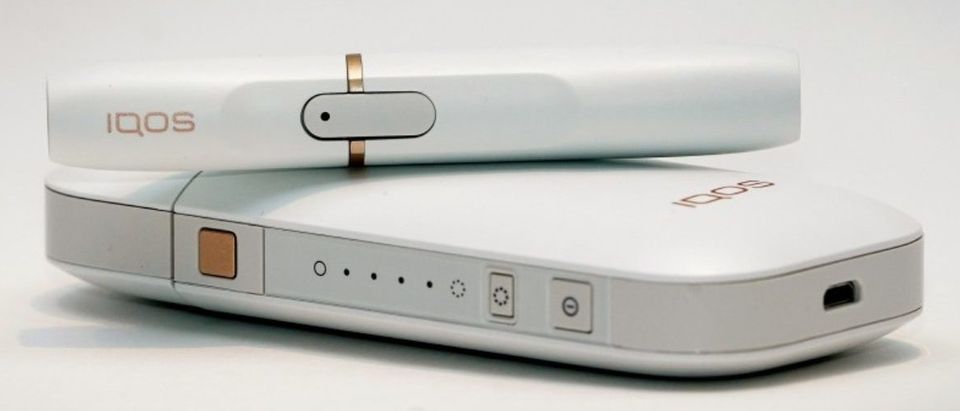Public health experts in the U.S. will meet soon to discuss the fate of an alternative smoking product currently driving a historic decline of cigarette sales in overseas markets.
The U.S. Food and Drug Administration’s Tobacco Products Scientific Advisory Committee will hold a meeting Jan. 24 regarding a product called iQOS, a heat-not-burn device developed by Philip Morris International (PMI). The focus will be PMI’s Modified Risk Tobacco Product (MRTP) application, submitted to the FDA in Dec. 2016 and accepted for review in May, which will determine if the iQOS can be marketed as a safer alternative to smoking, reports Vaping Post.
The meeting will serve to inform FDA officials currently reviewing the iQOS before a decision is made regarding approval of the MRTP application. The FDA began reviewing PMI’s product application for the iQOS in January 2017, which will determine if the product can be sold in the U.S. Previous speculation has suggested a decision on the iQOS device may be announced by the FDA sometime in February.
Unlike a traditional e-cigarette, which vaporizes nicotine fluid, the iQOS heats tobacco leaves. Users insert sticks resembling short cigarettes into the device, which heats a concentrated dose of tobacco, eliminating the harmful combustion process of cigarettes.
Heat-not-burn devices like Philip Morris International’s iQOS, which debuted in Japan last year before being introduced in additional countries, are proving insanely popular with consumers in overseas markets. British American Tobacco is competing with iQOS with a heat-not-burn device of their own called the glo.
Sales for combustible cigarettes are spiraling downward at levels never before seen in Japan’s tobacco market since the introduction of heat-not-burn products.
Japan cigarette volumes declined nearly 17 percent year-over-year, the “fastest rate of decline this year,” according to a report from Piper Jaffray released Dec. 15. The drop in sales far outpaces the 1 to 2 percent annual declines historically seen in cigarette volumes in the country.
Public health experts say this is further proof that smokers will opt for healthier alternatives that can help them quit combustible tobacco when given the choice.
PMI recently bought full page ads in some of largest media publications in the United Kingdom, claiming their New Year’s resolution is to “give up cigarettes.” The ads are reportedly the start of a broader campaign by PMI to promote the iQOS device in the U.K., with the goal of transitioning smokers to safer products.
“Our ambition is to stop selling cigarettes in the U.K.,” PMI claims in the ad, which appeared in the The Daily Mirror, The Sun and The Times of London. “It won’t be easy. That’s why we want to replace cigarettes with products, such as e-cigarettes and heated tobacco, which are a better choice for the millions of men and women in the U.K. who would otherwise not stop smoking. No cigarette company has done anything like this before.”
The campaign is likely to draw criticism from the tobacco control community, but recent research bolsters claims by tobacco companies that their alternative technologies are far safer than cigarettes.
The Committee on Toxicity, an independent scientific committee that advises health services in the U.K., released research in December on the health profile of heat-not-burn devices compared to cigarettes. The study concluded that the devices eliminate up to 90 percent of the harmful chemicals and carcinogens released by cigarettes by cutting out the combustion process.
The researchers urge caution, however, saying the devices still pose a risk to the user’s health, but acknowledge the potential of the devices as harm reduction tools for smokers.
Despite the promising news on alternative smoking technologies and their potential to reduce smoking-related illnesses and save millions of lives, health care bodies remain vehemently opposed to the products. The World Health Organization recently helped derail efforts to expand access to reduced-risk products in Turkey, a country with a high smoking rate.
Public health advocates focused on harm reduction are hopeful regulators in the U.S. will embrace the life saving potential of alternative technologies for current smokers.

The Daily Caller News Foundation is working hard to balance out the biased American media. For as little as $3, you can help us. Make a one-time donation to support the quality, independent journalism of TheDCNF. We’re not dependent on commercial or political support and we do not accept any government funding.
All content created by the Daily Caller News Foundation, an independent and nonpartisan newswire service, is available without charge to any legitimate news publisher that can provide a large audience. All republished articles must include our logo, our reporter’s byline and their DCNF affiliation. For any questions about our guidelines or partnering with us, please contact licensing@dailycallernewsfoundation.org.


